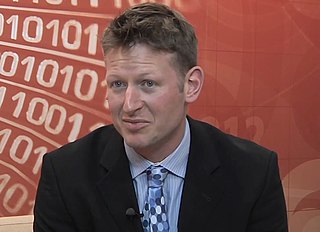Top 991 Carbon Dioxide Quotes & Sayings - Page 17
Explore popular Carbon Dioxide quotes.
Last updated on December 3, 2024.
I've been working on a graphic about carbon emissions. It's an incredibly simple graphic - a bunch of blocks and a table below it - but it's taken me three weeks to design. For some reason it just wasn't working. Then finally I realized there was a number present, which I was rendering in each version, that wasn't necessary for the understanding of the piece. This figure was getting in the way and distracting from the main flow of the narrative. As soon as I pulled that graphic out of the design, it sprang into focus. Suddenly it worked.
The government also has to get the public rules right. That means putting a price on carbon, so the cleaner forms of energy become more competitive. As soon as that happens, a tidal wave of new capital, innovation and entrepreneurship will flood into the clean energy space - creating new jobs and opportunities for Americans of all walks of life. We did that for the internet, with public investments in the basic system through the Pentagon, followed by rules that encouraged innovation and competition. And that is why the internet took off in the United States first.
Trees are very good friends. Firm friends. My five year olds tree could be relied upon to be there next day, uncritical and protective. And think of trees contribution to our lives. They provide boats, buildings, paper, furniture and, for clog-wearers, footwear. As well as contributing toothpicks and chopsticks they give little birdies somewhere comfy to sit. Best of all, they help produce breathable air and lock up that naughty carbon. Why is why I am talking to the Greens about giving trees the vote.
To change our national economic story from one of financial speculation to one of future growth, we need a third industrial revolution: a green revolution. It will transform our economy as surely as the shift from iron to steel, from steam to oil. It will lead us toward a low-carbon future, with cleaner energy and greener growth. With an economy that is built to last - on more sustainable, more stable foundations
Gansey appeared beside Blue in the doorway. He shook his empty bottle at her. "Fair trade," he told her in a way that indicated he had selected a fair-trade coffee beverage entirely so that he could tell Blue that he had selected a fair-trade coffee beverage so that she could tell him well done with your carbon footprint and all that jazz. Blue said, "Better recycle that bottle.
I know we need more nuclear power in order - nuclear power, after all, is not dependent on fossil fuels and emits no greenhouse gases. I believe we're going to be able to have coal-fired plants that have zero emissions. We need to work on carbon sequestration technologies. I mean, there's a lot we can do together and achieve the objective, which a lot of people want, which is the reduction of greenhouse gases, and at the same time, have viable economic growth.
This is sad. I just think it’s a little ridiculous we are still only looking at the surface of one another. Red hair? Blue hair? Pink? Blonde? Short? Long? Whatever. We might as well shave our heads. Hair has nothing to do with the reason we playing music. It’s a style. Something that will never last as long as the songs we play and the words we sing. Listen up ladies in bands, I’m so proud to be one of you and I don’t care if we all look exactly alike or if we are all carbon copies of each other. We have things to say and it’s up to us to get people to not just look but to LISTEN!
All the green in the planted world consists of these whole, rounded chloroplasts wending their ways in water. If you analyze a molecule of chlorophyll itself, what you get is one hundred thirty-six atoms of hydrogen, carbon, oxygen, and nitrogen arranged in an exact and complex relationship around a central ring. At the ring's center is a single atom of magnesium. Now: If you remove the atom of magnesium and in its exact place put an atom of iron, you get a molecule of hemoglobin. The iron atom combines with all the other atoms to make red blood, the streaming red dots in the goldfish's tail.
Each year we pump at least six billion tons of heat-trapping carbon into the innermost layer of our atmosphere, whose outer extent is only about twelve miles overhead. According to an IPCC (United Nations' Intergovernmental Panel on Climate Change) report released this year, atmospheric CO2 will, if the buildup is left unchecked, double from its pre-industrial level within the next century. That doubling of CO2 correlates with an increase in the global temperature of at least three to eight degrees Fahrenheit. The last ice age was just five to nine degrees colder than our current climate.
I want to break up the Wall Street banks. Hillary Clinton doesn't. I want to raise the minimum wage to 15 bucks an hour. She wants $12 an hour. I voted against the War in Iraq. She voted for the War in Iraq. I believe we should ban fracking. She does not. I believe we should have tax on carbon and deal aggressively with climate change. That is not her position.
Back in 2007, I met this white guy [director Peter Byck] with a lot of hair and a video camera, at a conference that I happened to be attending for the launch of an organization called Blacks in Green. I had never heard of him and Peter had never heard of me. We just started talking; he liked what I had to say, so he asked me if I'd be willing to be in this documentary he was doing about carbon pollution. I said, "Sure!" It was kind of a no-brainer.
Things happen very quickly and they have to happen quickly in order to have vitality, which I think is essentially part of a good pot. But in addition it means that you can explore an idea and change it and then change it and then change it; I don't mean by changing the one pot, but you make one pot then you make another that's related to that; you make another - you can make 50 pots in a day and none of them are going to be carbon copies of any other, but they'll all be related because there's something going through your mind about the form on that particular day.
I tell my students, with a feeling of pride that I hope they will share, that the carbon, nitrogen, and oxygen that make up ninety-nine per cent of our living substance were cooked in the deep interiors of earlier generations of dying stars. Gathered up from the ends of the universe, over billions of years, eventually they came to form, in part, the substance of our sun, its planets, and ourselves. Three billion years ago, life arose upon the earth. It is the only life in the solar system.
That’s the problem with all of this. No matter how hard I try, I can’t make it perfect. I can’t keep it in a bottle, can’t ignore reality. Chemicals are involved, the kind scientists try to synthesize and put into pill form, and they’re making tremendous advances every day. They’re winning the war against love. It’s probably inevitable now. There are only two ways to see the world: either no one and nothing is connected to anything, or we are all a random series of carbon molecules connected to each other. Tell me if there’s room for love in either of those scenarios.
When we get this health care done, America, we're going to be able to have regulations on how heavy you can be. And we're going to be able to set up various tax penalties, for example, if you weigh more than we think you should or we just may not let you get on that airplane because your carbon footprint, you're gonna waste so much jet fuel, we may not let you get on that bus, we may not let you drive your car, we may not build a bigger doorway for you to get through, may not give you a bigger toilet.'
To assert that the universe has a purpose implies the universe has intent. And intent implies a desired outcome. But who would do the desiring? And what would a desired outcome be? That carbon-based life is inevitable? Or that sentient primates are life's neurological pinnacle? Are answers to these questions even possible without expressing a profound bias of human sentiment? Of course humans were not around to ask these questions for 99.9999% of cosmic history. So if the purpose of the universe was to create humans then the cosmos was embarrassingly inefficient about it.
Essentially, my kids grew up with the emphasis on the environment because I became a political activist in about 1969 and it was not an easy time. Those were the days when the oil and gas companies pretty much controlled the show and anybody speaking about solar energy or carbon energy would get smashed down as being a radical or a tree-hugger or what have you. So I was out there feeling very often alone and my kids would get that.
We need scientists to design new fuels. We need farmers to help grow them. We need engineers to invent new technologies. We need entrepreneurs to sell those technologies. We need workers to operate assembly lines that hum with high-tech, zero-carbon components. We need builders to hammer into place the foundations for a clean energy age. We need diplomats and businessmen and women, and Peace Corps volunteers to help developing nations skip past the dirty phase of development and transition to sustainable sources of energy. In other words, we need you.
An outdated view still prevails that a low-carbon lifestyle requires immense personal suffering and sacrifice. In my view, nothing could be further from the truth. All the evidence shows that people who do not drive, do not fly on planes, do shop locally, do grow their own food, and do get to know other members of their community have a much higher quality of life than their compatriots who still persist in making the ultimate sacrifice of wasting their lives commuting to work in cars.
The climate crisis is the greatest challenge humanity has ever faced. From not only the warming of the earth with higher global temperatures, but also from strengthening storms and expanding droughts to melting ice and rising seas, the costs of carbon pollution are already being felt by governments, corporations, taxpayers and families around the world. The climate crisis will affect everything that we love and alter the course of our future. Now, more than ever, we must come together to solve this global crisis. We must act decisively, rise to the occasion and solve this monumental challenge.
Scientists are telling us that 350 parts per million [of carbon] in the atmosphere is the upper limit. We're at 387 parts per million now, and we're up in that zone where the risk of going past irrevocable tipping points is elevated. It's no different than going to a doctor and learning your cholesterol is too high, and you're at risk for a heart attack. You have to work to lower your cholesterol and hope to get there before the heart attack comes.
Today, natural gas now outstrips coal as the leading provider of electricity in America. If this is as big as people believe it is, natural gas will soon be powering trucks and marine ships. Maybe even standard commercial cars that people use at home through compressed natural gas, other gas to liquids. The potential is there for more energy independence by America and a reliance on cleaner fuel - natural gas emits half as much as coal, in terms of carbon emissions. That's a real bounty.
Probably no single event highlights the strength of Campbell's argument (on peak oil) better than the rapid development of the Alberta tar sands. Bitumen, the world's ugliest and most expensive hydrocarbon, can never be a reasonable substitute for light oil due to its extreme capital, energy, and carbon intensity. Bitumen looks, smells, and behaves like asphalt; running an economy on it is akin to digging up our existing road infrastructure, melting it down, and enriching the goop with hydrogen until it becomes a sulfur-rich but marketable oil.
If I drive my car to the store, those carbon molecules that are emitted actually get into the atmosphere circulation systems and affect climate in a global basis. This is shocking, this is amazing! No one in the 18th Century would have believed that anything like this were at all possible and I don't think we have, as part of our common sense, morality, norms and values that are really responsive to those kinds of issues, to the kind of power that we now are able to exert over the future and over people who live very far from us.
Although population and consumption are societal issues, technology is the business of business. If economic activity must increase tenfold over what it is today to support a population nearly double its current size, then technology will have to reduce its impact twenty-fold merely to keep the planet at its current levels of environmental impact. For example, to stabilize the climate we may have to reduce real carbon emissions by as much as 80 percent, while simultaneously growing the world economy by an order of magnitude.
Mr L Prosser was, as they say, only human. In other words he was a carbon-based life form descended from an ape. More specifically he was forty, fat and shabby and worked for the local council. Curiously enough, though he didn't know it, he was also a direct male-line descendant of Genghis Khan, though intervening generations and racial mixing had so juggled his genes that he had no discernible Mongoloid characteristics, and the only vestiges left in Mr L Prosser of his mighty ancestry were a pronounced stoutness about the tum and a predilection for little fur hats.
Energy is a sector of the economy that has been particularly resistant to innovation. This is precisely the problem. It is why we are still dependant on energy sources that are 100 to 150 years old while virtually every other sector of the economy has transformed itself. This is why we believe that the faith that many environmentalists still hold that carbon regulations and taxes will drive sufficient private sector investment into energy markets to create the kind of innovation we need is unfounded.
What are the top 20 universities in the world that do good materials research that might create carbon fibers to do jet stream kites or new magnets that will allow [energy] generation to be done up there and you just bring the electricity down. You either have to bring down rotational energy, which is hard, or you have to have the generator up there and bring down the electricity. Well, putting the generator up there is hard to do because it's too heavy.
When carbon (C), Oxygen (o) and hydrogen (H) atoms bond in a certain way to form sugar, the resulting compound has a sweet taste. The sweetness resides neither in the C, nor in the O, nor in the H; it resides in the pattern that emerges from their interaction. It is an emergent property. Moreover, strictly speaking, is not a property of the chemical bonds. It is a sensory experience that arises when the sugar molecules interact with the chemistry of our taste buds, which in turns causes a set of neurons to fire in a certain way. The experience of sweetness emerges from that neural activity.
There's more and more recognition that a carbon economy is dangerous to us economically. And there is increasing recognition that renewable fuels have economic value as well as obvious value for our health and our well-being and our survival. In fact, as you know, the economic revolution in renewable fuels has been impressive. It really had not been anticipated.
That beautiful sister of mine was an overwhelming and volatile mixture. One had the feeling that she'd been shot from a canon and showered her sparks over an incredulous world with no thought or care where they fell, a carbon copy of father. She was like some silvery comet who streaked through life with daring speed, the wellspring of which was an inner confidence that I deeply admired. At times, particularly in childhood, I was intimidated by her but she dictated from an aura of affection for me that was never threatening.





























